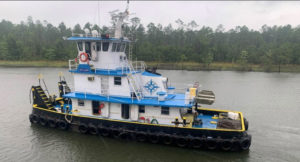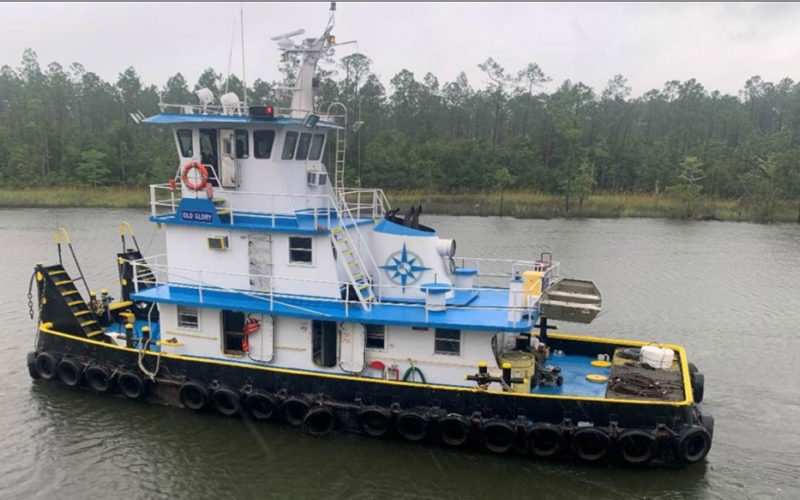
Old Glory and its loaded hopper barge approached a bridge over the Intracoastal Waterway (ICW) near Fort Pierce, Fla., when a strong current set the tow to port, pushing the vessels outside the navigation channel.
The relief captain turned to starboard to counter the current, which again set the tow toward the port. The tow’s stern was 65 feet outside of the channel with Peter P. Cobb Memorial Bridge a quarter mile ahead.
Recognizing a collision was imminent, the relief captain sounded the tug’s general alarm. The 230-foot barge Cole carrying dredge material hit the bridge’s eastside protective fendering on Aug. 19, 2020, at about 0251.
Nobody was hurt, and there was no pollution. Cole sustained minor damage, but the bridge fendering cost nearly $650,000 to repair.
National Transportation Safety Board (NTSB) investigators determined the relief captain failed to conduct an adequate navigational assessment. As such, strong cross currents near the bridge caught him by surprise.
“Both the United States Coast Pilot and navigational charts had information on ‘strong cross’ and ‘extremely fast’ currents in the area of the Peter P. Cobb Memorial Bridge,” the NTSB report said. “Although the relief captain acknowledged the available navigational information on the vessel’s ECS and in the United States Coast Pilot publication, he did not use all the resources available to him.”
Old Glory got underway Aug. 17 at 1900 from Hillsboro Beach, Fla., en route to Jacksonville, Fla. The tow’s total length was 281 feet, and it was drawing 7 feet.
The relief captain began watch at about midnight on Aug. 19, and he reported using the vessel’s electronic chart system to monitor tides and currents. The transit was uneventful until the tow approached the Peter P. Cobb Memorial Bridge at ICW mile 965.
The deckhand came to the wheelhouse to serve as a lookout during the overnight bridge transit. The vessel was making 5.5 mph with a course over ground of 337 degrees when the current impacted the tow.
“According to the relief captain, the current started to set the vessel and tow from the center to the west side of the channel,” the NTSB report said. About 0246, the course over ground of the tow was now 333°, and the bow of the barge was outside the western limit of the channel.”
The tow began to “bog down” as it crossed into the Fort Pierce City Marina channel, outside the main navigation channel, and only 6.5 feet deep. Investigators said it was possible the tow’s stern hit a sandbar in the shallower waterway.
The relief captain tried to twist Old Glory’s stern to line up Cole’s bow for the bridge transit. As that proved unsuccessful, then he began backing down. Again, he found the tow not behaving as he expected, suggesting the tow was stuck on a sandbar or the propeller wash was hitting the barge. Soon, Cole hit the bridge fendering, damaging a 55-foot section under the span and wedging the tow between the east and west fendering.
The starboard face wires holding Old Glory and Cole together parted during the collision. Crew replaced the line and notified authorities and the vessel owner before straightening out and passing under the bridge at about 0635. The Coast Guard allowed the tow to continue to Jacksonville, the report said.
Although the relief captain said he had checked the tow’s electronic chart system for tidal conditions and currents, he did not expect the cross-current to be running near low tide. He admitted not referring to the Coast Pilot but said the captain was responsible for voyage planning, the NTSB said.
The Coast Pilot warns that vessels approaching the bridge from the north or south should maintain sufficient headway to minimize the effects of the cross current. The current at the bridge at the accident time was predicted to be at maximum velocity, ebbing at about 1.6 mph.
“Had the relief captain been aware of the cautionary note and information contained in the United States Coast Pilot, he would have been better prepared to address the risk of strong currents often seen near the Peter P. Cobb Memorial Bridge,” the NTSB said.
The relief captain had about 10 years of experience operating towing vessels and had successfully transited the bridge three times prior to the accident. Drug and alcohol tests were negative, and he said he felt well rested after seven hours of sleep, the NTSB said. He was not named in the report.
River Ventures LLC, owner and operator of the Old Glory, declined to comment on the NTSB findings.

